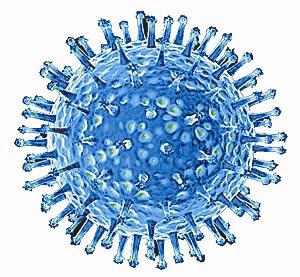

 |
| H7N9 virus (File photo) |
HONG KONG, March 22 (Xinhua) -- A mutation in H7N9 avian flu virus that can enhance the ability of the virus to infect humans was identified by researchers from the University of Hong Kong, which made the finding public on Wednesday.
The research team from the university's State Key Laboratory for Emerging Infectious Diseases of and the department of Microbiology analyzed the H7N9 virus genome collected from 2013 onwards and revealed that efficient infection of both avian and human cells by H7N9 viruses is supported by a unique nucleotide substitution (NS-G540A) in NS segment, where the mutation is located within a previously undefined exonic splicing enhancer (ESE).
Mutation in ESE identified in the viral genome of H7N9 virus enhances the ability of virus replication in mammalian cells. It is notable that human infections with H10N8 and H5N6 subtype avian influenza viruses contain the same mutation in the viral genome.
This mutated nucleotide emerged in early 2000 in H9N2 strains and has since spread in avian influenza viruses, becoming the dominant genotype among avian influenza viruses from 2012 onwards, the researchers said.
Viruses that can infect humans are normally refrained from replication and transmission in avian cells. Yet the mutation in H7N9 virus can enhance the virus replication in mammalian and human cells.
The mutation enables H7N9 virus to possess the cross-species transmission ability to infect humans. The primed condition of NS-G540A among H7N9 virus enhances replication ability in mammalian hosts and facilitates viral acquisition of other adaptive mutations during virus infection, which enables H7N9 virus to infect humans more effectively than other avian influenza viruses.
"This study provides a plausible mechanism to explain the molecular properties which allows H7N9 virus to infect humans while retaining the ability to circulate in avian species," Chen Honglin, Professor of the university's Faculty of Medicine said.
The finding provides an important biomarker for monitoring the emergence and transmission of avian influenza viruses in humans and preventing human-to-human infection of the viruses, Chen said, adding the mutation can also serve as a novel target of anti-influenza drug development.
The research has been published in the international journal Nature Communications.
 Fire brigade in Shanghai holds group wedding
Fire brigade in Shanghai holds group wedding Tourists enjoy ice sculptures in Datan Town, north China
Tourists enjoy ice sculptures in Datan Town, north China Sunset scenery of Dayan Pagoda in Xi'an
Sunset scenery of Dayan Pagoda in Xi'an Tourists have fun at scenic spot in Nanlong Town, NW China
Tourists have fun at scenic spot in Nanlong Town, NW China Harbin attracts tourists by making best use of ice in winter
Harbin attracts tourists by making best use of ice in winter In pics: FIS Alpine Ski Women's World Cup Slalom
In pics: FIS Alpine Ski Women's World Cup Slalom Black-necked cranes rest at reservoir in Lhunzhub County, Lhasa
Black-necked cranes rest at reservoir in Lhunzhub County, Lhasa China's FAST telescope will be available to foreign scientists in April
China's FAST telescope will be available to foreign scientists in April "She power" plays indispensable role in poverty alleviation
"She power" plays indispensable role in poverty alleviation Top 10 world news events of People's Daily in 2020
Top 10 world news events of People's Daily in 2020 Top 10 China news events of People's Daily in 2020
Top 10 China news events of People's Daily in 2020 Top 10 media buzzwords of 2020
Top 10 media buzzwords of 2020 Year-ender:10 major tourism stories of 2020
Year-ender:10 major tourism stories of 2020 No interference in Venezuelan issues
No interference in Venezuelan issues
 Biz prepares for trade spat
Biz prepares for trade spat
 Broadcasting Continent
Broadcasting Continent Australia wins Chinese CEOs as US loses
Australia wins Chinese CEOs as US loses